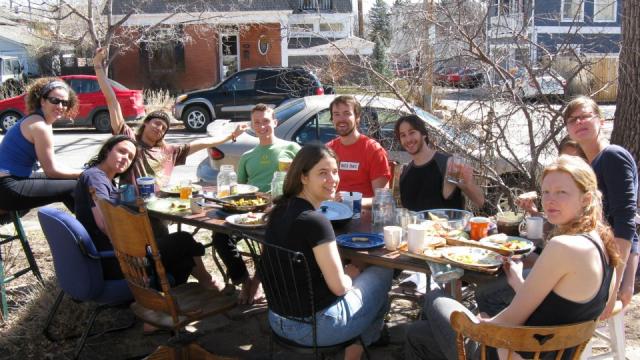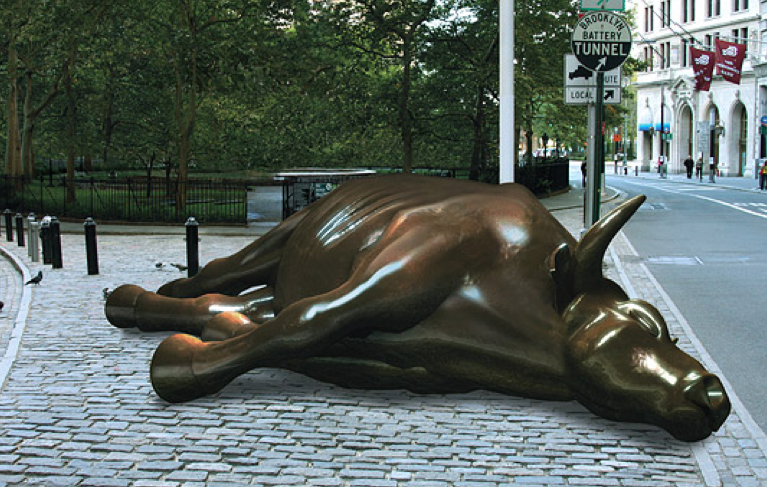
I live in a co-op house with 30 other people in Madison, Wisconsin. While we pay rent to the nonprofit organization that manages Madison’s co-op properties, our only landlords are each other. We have weekly meetings to discuss house business and make decisions in a democratic process, using a consensus model. We agree to not buy any food or products for the house that come from detestable companies like Monsanto, Koch Industries and Tyson, and get most of the ingredients for house meals from the farmer’s market and a local food co-op. We all actively take part in our own residence by making sure things are kept (relatively) clean, problems are solved quickly, and the house remains a thriving community.
As 30 people all living in one big house, sharing expenses, growing our own food in rooftop gardens and recycling/composting as much we can, our environmental footprints are much smaller as a whole. Also, I only pay $500 a month in rent, utilities, washer/dryer, internet, and even food. And this is in a house within walking distance of the downtown area, right on the lakefront.
This made me wonder - why did I ever allow myself to live alone with no community and pay a landlord who doesn't make decisions with tenants in a democratic process? And why did I do it considering that form of living cost twice as much as my current housing situation? It's just one example of cooperative economics replacing the outdated corporate capitalist model.
We’re witnessing capitalism’s death throes right now. The stock market surges to new highs on a regular basis, corporate profits soar every quarter, and taxes on corporations as a percentage of GDP are lower than they’ve ever been in decades. Despite all the success of corporations, they’re actually squeezing more productivity out of their workers by laying off their coworkers.
Productivity is at historic highs, but Americans making minimum wage have less buying power as a whole now than they did 51 years ago. Like all top-heavy structures, it won’t be too long before the unsustainable model of everlasting growth comes to a crashing halt. The co-op movement will become our new economic model if we start seriously building it now and introducing mainstream America to co-op living and working in the next 5 years. It’s already happening in several parts of the country.
Richmond, California had a chronic unemployment problem, and decided to tackle it by thinking outside the box with the co-op model in mind. After Gayle McLaughlin, a Green Party candidate, was elected mayor, a hub of co-op businesses emerged where workers all owned their labor. The community modeled their efforts after the Mondragon co-op in Spain, the world’s largest successful co-op business with 83,000 employees.
When the Windows & Doors factory closed in Chicago, fired all its workers and vacated its building, the workers eventually realized there was still a demand so they took over the vacant building and re-opened the business as a co-op. Imagine if GM’s workers decided to take over the business after the corporate model failed. Imagine how many workers could have shared the boost in profits from the company’s recovery!
Co-op residences are also great organizing spaces. One of the biggest blows to the Occupy movement was being evicted from the spaces which had become our central organizing hubs. But in a residential co-op community that makes decisions by consensus and decides on house responsibilities through elected positions, everyone takes an interest in their community and works to maintain it. The same holds true when a worker is responsible for their labor – they strive to be more productive, so they can share directly in the profits instead of cede it all to a corporate executive in exchange for a 25-cent an hour raise. When living and working in a co-op environment, one learns solidarity and teamwork as a way of life that's also best for self-preservation.
The cooperative economic model can also apply to banks, as seen in the Bank of North Dakota. It’s a bank that works with 80 community bank branches to collectively store and invest the money of North Dakota’s people. It stores North Dakota’s tax revenues and distributes its profits to the state treasury and the people of North Dakota, who are their shareholders.
The bank doesn’t engage in risky Wall Street gambling on the derivatives or credit default swap markets. The bank’s executives, while making a comfortable six-figure salary, aren’t paid exorbitant salaries and bonuses, defeating the argument of Wall Street executives that high pay is the cost of effective financial management. Using that model, we can and should nationalize the Federal Reserve and make it the people's public bank, instead of Wall Street's arm of control over our currency and economy.
With a nation fully engaged in a society where cooperative resident-owned housing and cooperative, worker-owned labor is the norm, public banking and hyper-localized economies will also become the new norm. This is essential because with the collapse of capitalism will come numerous other solutions for systems that will only exacerbate the problems of wealth inequality, poverty, debt and unemployment. The co-op model is the best model to succeed capitalism, as it still incentivizes workers and residents to do the best they can for a positive living environment or a lucrative career while also doing away with the corporate hierarchy that is an unnecessary drain on workers’ financial and emotional vitality. It’s the best solution for poverty and inequality, two of the most common byproducts of capitalism.
Co-ops are a perfect antidote to homelessness. There are six vacant houses for every homeless person; we can simply occupy these buildings, file for nonprofit status and form a co-op fair housing organization that employs the homeless to adapt the vacant buildings to modern code, while allowing them to live in the spaces they renovate.
Co-ops can also be formed in “food desert” neighborhoods, where the lack of affordable healthy food options within walking distance leads to obesity and other resulting health problems in a community. If a co-op formed to employ people to build, plant and maintain community gardens to supply healthy local food for the community, isn’t that worth a public investment?
All it takes to form a co-op is a small group of determined people all set on an idea to cooperatively own and operate a facet of the economy and allow them to make decisions in a democratic process. By democratizing society through housing and work, we can start a new revolution in our politics, our economy, and even our environment by choosing to consume sustainably and minimize our impact on the planet. It’s up to us - let’s get it done.
3 WAYS TO SHOW YOUR SUPPORT
- Log in to post comments
















